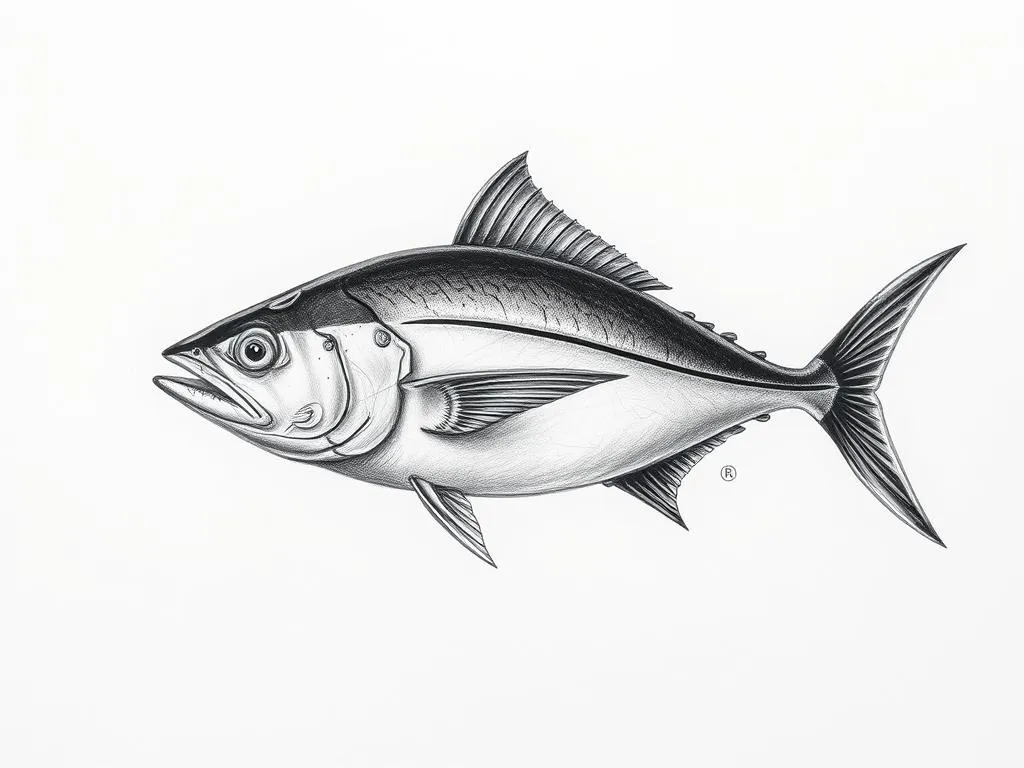The Deep Symbolism of Tuna: A Journey Through Meaning and Spirit

Disclaimer: Some images on this website are AI-generated artworks and may not accurately represent real animals.
The symbolism and meaning of tuna extend far beyond its role as a culinary delight. This magnificent fish embodies strength, resilience, and abundance in various cultures, making it a significant figure in both spiritual and practical realms. In this article, we will explore the biological characteristics of tuna, their cultural significance, and the rich tapestry of meanings associated with them.
Understanding the Tuna
Biological Overview
Tuna are remarkable marine creatures belonging to the family Scombridae. Known for their streamlined bodies and incredible speed, these fish are found in warm seas around the world. Below is a table outlining some physical characteristics of various tuna species:
| Tuna Species | Length | Weight | Habitat |
|---|---|---|---|
| Bluefin Tuna | Up to 12 feet | Up to 1,500 lbs | Atlantic and Pacific Oceans |
| Yellowfin Tuna | Up to 6.5 feet | Up to 400 lbs | Tropical and subtropical waters |
| Albacore Tuna | Up to 4 feet | Up to 100 lbs | Temperate oceans |
| Skipjack Tuna | Up to 3 feet | Up to 40 lbs | Tropical and subtropical waters |
These fish are known for their impressive migratory patterns, often traveling vast distances in pursuit of food and spawning grounds. Their adaptability and survival skills have made them a vital part of marine ecosystems.
Cultural Significance
Throughout history, tuna have held a unique place in various cultures. In Japan, for instance, the Bluefin tuna is celebrated for its culinary value, especially in sushi and sashimi. In indigenous cultures, tuna symbolize sustenance, representing a connection to the ocean and the abundance it provides.
The role of tuna extends beyond food; they are integral to the oceanic food web. As predators, they help maintain the balance of marine life, symbolizing the interconnectedness of ecosystems. This cultural significance is pivotal in understanding the deeper meanings associated with tuna.

Symbolism & Spiritual Meaning
Strength and Resilience
Tuna are often seen as symbols of strength and resilience. Their remarkable ability to navigate vast oceanic expanses highlights endurance and tenacity. In spiritual contexts, encountering tuna can symbolize the need to persevere through challenges, reminding individuals that they possess the inner strength to overcome obstacles.
Speed and Agility
The swift movements of tuna through the water make them symbols of speed and agility. These qualities resonate with the idea of overcoming life’s hurdles and adapting to ever-changing circumstances. The ability of tuna to swiftly evade predators and travel long distances can inspire us to approach our challenges with a similar mindset, urging us to act decisively and efficiently.
Abundance and Prosperity
In many cultures, tuna are also seen as symbols of abundance and prosperity. Their role as a vital source of food connects them to themes of fertility and wealth. When tuna appear in our lives—whether in dreams, art, or folklore—they often carry messages of hope, suggesting that abundance is within reach, and it encourages us to be open to receiving it.
Tuna in Dreams
Dream Interpretation
The appearance of tuna in dreams can carry significant meanings, often reflecting the dreamer’s emotional state and life circumstances. The symbolism and meaning of tuna in dreams can vary, but they often signify:
- Freedom: The vast ocean represents the dreamer’s desire for independence and exploration.
- Abundance: Tuna may symbolize a forthcoming period of prosperity or success.
- Adaptation: Encountering tuna in dreams may suggest the need for flexibility in facing life’s challenges.
Common Themes
Below is a table summarizing themes associated with tuna in dreams:
| Theme | Interpretation |
|---|---|
| Freedom | Desire for independence and exploration |
| Abundance | Anticipation of prosperity and success |
| Adaptation | Need for flexibility in challenges |
| Strength | Encouragement to draw on inner resilience |
Interpreting these dreams can provide valuable insights into our inner thoughts and feelings, encouraging personal growth and self-awareness.
Tuna in Folklore and Mythology
Cultural Myths
Tuna have also found their way into various folklore and mythology. In some Pacific Island cultures, tuna are revered as symbols of strength and are featured in creation myths. These narratives often depict tuna as powerful beings that bring abundance to the people, emphasizing their importance in sustaining life.
Lessons from Folklore
The stories surrounding tuna often impart essential lessons about the interconnectedness of nature and the respect needed for marine life. They remind us that our actions can have far-reaching consequences on the environment and encourage stewardship of the oceans.
Modern Interpretations
Environmental Awareness
In contemporary discussions, tuna have become symbols of environmental awareness. As overfishing and habitat destruction threaten tuna populations, they remind us of the fragility of marine ecosystems. This evolving symbolism urges society to advocate for sustainable practices and protect the oceans, emphasizing our collective responsibility to ensure the survival of these majestic creatures.
Culinary Symbolism
Tuna’s significance extends into the culinary world as well. As a staple in global cuisine, especially in sushi and Mediterranean dishes, tuna embodies global interconnectedness. Its presence on our plates serves as a reminder of the cultural exchanges that shape our culinary landscape, highlighting the importance of respecting the origins and sustainability of our food sources.
Key Takeaways
- The symbolism and meaning of tuna encompass strength, resilience, speed, and abundance.
- Tuna serve as reminders of the importance of sustainability and environmental stewardship.
- Encountering tuna, whether in dreams or folklore, often signifies personal growth and adaptability.
- The cultural significance of tuna reflects their vital role in marine ecosystems and global cuisine.
Encouraging reflections on these themes may help individuals connect more deeply with their own experiences and the broader implications of their choices.
Conclusion
The deep symbolism and meaning of tuna transcend mere culinary appreciation. They embody vital qualities such as strength, agility, and abundance, resonating through dreams, folklore, and modern interpretations. Tuna’s enduring relevance in our lives serves as a reminder of the interconnectedness of nature and the importance of protecting marine ecosystems.
As we navigate our own journeys, let us draw inspiration from the tuna’s resilience and adaptability, fostering a deeper appreciation for marine life and the rich tapestry of meanings it offers. By embracing these symbols, we can cultivate a more profound respect for the oceans and the creatures that inhabit them.







